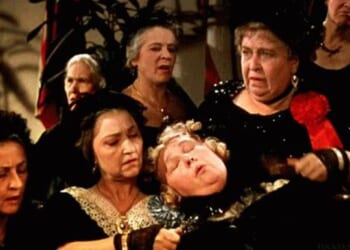A recurring theme — or trope — around President Donald Trump’s second term is the administration’s putative goal to outsource governmental functions to the private sector. In light of oral arguments in FCC v. Consumers’ Research last month, it’s worth looking at a bill that Trump signed into law during his first term, delegating government powers to a private entity. That law is currently facing private non-delegation challenges in the courts, and the entity it empowered is under Congressional scrutiny for its day-to-day operations.
We’ve come to expect such compromises that leave everyone unsatisfied from Chief Justice Roberts in his quests for clear if narrow majorities.
At issue in FCC v. Consumers’ Research are two delegations of authority: from Congress to the FCC, and then from the FCC to a private corporation, the Universal Service Administrative Company, to determine carriers’ contributions to the Universal Service Fund.
Justice Alito raised the key question of whether the FCC took the USAC’s recommendations as inputs for a considered decision-making process or if the FCC simply rubber-stamped the USAC’s pronouncements. If the latter, then Congress and the FCC had unconstitutionally delegated a legislative function, the power to set a tax rate, to a private entity.
The 2018 amendment to the Ted Stevens Olympic and Amateur Sports Act will never have to face such scrutiny because it cuts out the executive branch middleman altogether.
Trump signed this bill in the wake of devastating Congressional testimony and media reports from American gymnasts about decades of sexual abuse by USA Gymnastics doctor Larry Nassar. Under the pressure to do something to prevent another Nassar from preying on young athletes, Congress delegated fundamental legislative power to the U.S. Center for SafeSport, an independent 501(c)3.
The law gives the U.S. Center for SafeSport jurisdiction “over the [United States Olympic and Paralympic Committee] and each national governing body with regard to safeguarding amateur athletes against abuse, including emotional, physical, and sexual abuse, in sports.” It directs the center to “establish mechanisms that allow for the reporting, investigation, and resolution … of alleged sexual abuse in violation of the Center’s policies and procedures.”
Those mechanisms, policies, and procedures take shape as the SafeSport Code.
The law goes on: “The policies and procedures developed under [the above clause] shall apply as though they were incorporated in and made a part of [this law].”
This is an unusually stark example of dynamic incorporation, “where an act of Congress incorporates future rules that someone else may create.” That term itself, though, “is misleading … What dynamic incorporation in fact does is delegate lawmaking power to someone else on an ongoing basis.”
Proving the point, the center has revised the SafeSport Code annually, often in response to cases and controversies it has encountered in the preceding year.
In her opening statement in FCC v. Consumers’ Research, Acting Solicitor General Sarah Harris brushed off the non-delegation argument, not on doctrinal grounds but on the relative triviality of USAC’s actions balanced against the oversight of the FCC. “[Respondents] challenged the FCC’s reliance on USAC to calculate carriers’ proposed contribution fee. But the FCC itself reviews, publishes, and adopts the fee for it to take effect. That is a basic delegation of accounting tasks, not grounds for the Magna Carta.”
The scope of the center’s authority, its internal procedures, and the range of sanctions it can impose are closer to being “grounds for the Magna Carta” than they are to accounting tasks.
The Code provides a menu of sanctions the Center can dispense. Most significant is a lifetime ban “from participating, in any capacity, in any program, activity, [e]vent, or competition” that is in any way under the auspices of the U.S. Olympic movement, “or at a facility under the jurisdiction of the same.” That does not mean only Olympic-level activities. Local track & field meets, swim clubs, and pick-up leagues often carry certification from a national governing body, if only for insurance or marketing purposes, bringing them under the USOPC’s umbrella. For a sports coach or administrator, a ban ends their career.
But how would anyone know that someone is subject to such a ban?
The amendment to the Ted Stevens Act that Trump signed requires the center to “publish and maintain a publicly accessible internet website that contains a comprehensive list of adults who are barred by the Center.”
The Centralized Disciplinary Database is the ninth circle of blacklisting: being placed on a publicly accessible list that the general public associates with one of the most notorious and prolific pedophiles in American history, Larry Nassar. If being banned ends your career, the listing ends your social and professional life. Little wonder that an accusation to the Center has been linked to at least two suicides.
An individual can be placed on the list without any opportunity to defend themselves. Neither the Act nor the Code even offer a hearing before the center imposes a sanction.
Once the center has made their final ruling on someone, the Code offers a single, one-time avenue for redress: binding arbitration. “The parties waive, to the fullest extent permissible by law, any right to challenge in court the Arbitrator Decision.”
The SafeSport Code takes the Ted Stevens Act’s grant of legislative powers to give itself the near-judicial authority to deprive people of economic liberties in the absence of due process. It then places a “‘keep out’ sign on the courtroom door,” all without any public oversight on the Center’s action. No government official — no one with accountability to the electorate — has even a nominal role in the creation, enforcement, or review of the center’s practices. The center operates independently of all three branches of government despite taking their authority directly from Congress.
Justices Gorsuch, Thomas, Roberts, and Alito used Gundy v. United States (2019) to signal their interest in reviving the non-delegation doctrine.
Like the Center for SafeSport, Gundy dealt with “some of the least popular among us.” Gundy was a convicted sex offender who challenged the Attorney General’s determination — upon a grant of legislative authority — to retroactively require him (and others like him) to register with a sex offender database. Gorsuch expressed some pique that Alito wanted to wait for a better case, given that the law in Gundy “scrambles [the Constitution’s] design. It purports to endow the nation’s chief prosecutor with the power to write his own criminal code governing the lives of a half-million citizens.”
Justices Alito, Gorsuch, and Thomas were stymied again in 2022 when the Court denied cert in Texas v. Commissioner of Internal Revenue. “To ensure the Government remains accountable to the public, it ‘cannot delegate regulatory authority to a private entity.’ Here, however, that is precisely what happened. What was essentially a legislative determination … was made not by Congress or even by the Executive Branch but by a private group. And this was no inconsequential matter,” Alito wrote.
Waiting for a Strong Non-Delegation Case
Even with this much interest, the Court could still defer addressing private non-delegation in FCC v. Consumers’ Research if they find that the public delegation — from Congress to the FCC — was unconstitutional. Acting Solicitor General Harris offered this option in her opening statement: if the public delegation is improper, then there’s no point in arguing a private delegation.
We’ve come to expect such compromises that leave everyone unsatisfied from Chief Justice Roberts in his quests for clear if narrow majorities.
If the non-delegationists on the bench want the closest thing to a sure thing, they will have to wait a few years for a challenge to the U.S. Center for SafeSport to make its way up the courts. The Ted Stevens Act amendment of 2018 is almost purpose-built for a revival of the non-delegation doctrine.
There’s a bit of irony in the fact that President Trump gets no credit for authorizing a sexual abuse watchdog entity because it conflicts with many narratives about him, while that entity quickly became the sort of institutional weapon that has been wielded against him.
Still, the sense of urgency that propelled its writing and passage has a parallel in the political momentum and populist drive for Trump and advisers like Elon Musk to move fast and break things. Their desire to turn government over to business could founder on an earlier Trump-approved delegation of federal power to a private entity.
READ MORE from George M.J. Perry:
Defending Reputation From Defamation-by-Blacklist
Why We (Sadly) Need to Prove the Obvious About Sex in Sports


![NYC Tourist Helicopter Falls into Hudson River, Siemens Executive and Family Among Those Killed [WATCH]](https://www.right2024.com/wp-content/uploads/2025/04/NYC-Tourist-Helicopter-Falls-into-Hudson-River-Siemens-Executive-and-350x250.jpg)






![Red Sox Fan Makes the ‘Catch of the Day’ with Unconventional ‘Glove’ [WATCH]](https://www.right2024.com/wp-content/uploads/2025/04/Red-Sox-Fan-Makes-the-‘Catch-of-the-Day-with-350x250.jpg)
![Green Day’s Cringe Trump Diss Ends in Fire and Evacuation [WATCH]](https://www.right2024.com/wp-content/uploads/2025/04/Green-Days-Cringe-Trump-Diss-Ends-in-Fire-and-Evacuation-350x250.jpg)






